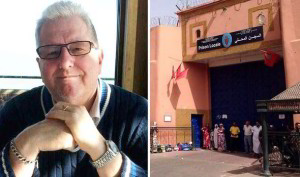By Kathryn Maureen Ryan
Managing Editor, Impunity Watch
JERUSALEM, Israel/Palestine – Israel’s military offensive against Hamas in Gaza during, which approximately 2,100 Palestinians and 73 Israelis lost their lives over the course 50-days, drew commendation from members of the international community. Among the most highly criticized operations that took place during the conflict was an Israeli air and artillery bombardment carried out on August 1st that killed 150 people in a matter of hours, the events of which unfolded just as a three-day ceasefire was supposed to enter into effect. Hamas militants emerged from a tunnel inside the Gaza Strip and ambushed three Israeli solders, killing two and taking the third hostage. Hamas representatives claimed the ambush was carried out before the ceasefire was scheduled to take effect while the Israeli military claims it was carried out after. Israeli reacted to the ambush and kidnapping of an Israel solder by invoking the controversial Hannibal Directive.
The Hannibal Directive is a protocol that calls on Israeli Defense Forces to rescue a captured solider, dead or alive, to ensure that Hamas cannot use the soldier as a hostage. The Israeli Army allegedly invoked the Hannibal directive as an order compelling units to do everything they can to recover an abducted comrade.
The order led to a furious assault on a confined area on the eastern edge of Rafah, the largest city in southern Gaza. The city is home to around 200,000 people. Israeli artillery and tanks bombarded four neighborhoods for several hours – at times firing a shell a minute. Fighter jets also carried out air strikes in the area. Medics in Gaza say around 200 people were wounded, the majority of whom were civilians. 150 people were killed during the bombardments making August 1st the deadliest day of the seven week conflict. Some legal experts say the use of the Hannibal Directive in this matter, which called on the Israeli military to use any means necessary, including the targeting of areas heavily inhabited by civilians, may have constituted a war crime.
The Israel Defense Forces have not clearly defined the Hannibal Directive. The Hannibal directive was first drafted in 1986 after three soldiers from the Givati Brigade were captured in Lebanon. Their saw the vehicle getting away and did not open fire on the captors. Israel has in the past paid a heavy political price for kidnapped soldiers. In 2006, Gilad Shalit was seized near Gaza and spent five years in Hamas captivity. He was released in exchange for more than 1,000 Palestinian prisoners. Critics say the Hannibal directive throws international humanitarian law out of the window in the interests of preventing a hostage situation, not only are civilians in the conflict thrown in the crossfire but the directive itself also suggests that the goal of the Israeli military should be to prevent hostage situations at all costs, even concluding that it is better to have a dead soldier than a captured one.
In the weeks since August 1st, civil rights activists, international legal experts and even some Israeli military officers have raised concerns about the legality and morality of the assault. One specific reservation is whether the attack was proportionate and discriminate, specifically whether the abduction of a single soldier could have justified a heavy and relentless use of force in a heavily populated area.
A panel set up by the United Nations’ Human Rights Commission is due to start investigating potential abuses in the war by both sides in the near future, with the August 1st incident in Rafah set as one of several incidents investigators have indicated they will examine. The head of the U.N. Human Rights Commission panel investigating the Gaza war has said any evidence it gathers could be used by the International Criminal Court in a potential war crimes case against Israel. The panel’s final report is due by March next year.
For more information please see:
Al Arabiya – Egyptian foreign policy stages comeback after Gaza summit – 13 October 2014
Reuters – Did Israel’s ‘Hannibal directive’ lead to a war crime in Gaza? – 13 October 2014
BBC News – Palestinian leader accuses Israel of ‘genocide’ at UN – 26 September 2014
The Times of Israel – IDF disputes death toll after Rafah kidnap attempt – 22 September 2014

